Who’s going to put Egypt back together again?
“What do you think of President Sisi”, asked one of the charming young ladies who had been helping me buy a train ticket. “Well, er um”, I waffled, trying not to commit myself too much in one direction. We were, after all, standing by a group of people queueing for tickets and the wrong opinion, too firmly expressed has caused some to disappear without trace during his excellency’s reign. “I hate him”, she spat, making no effort to moderate her tone or volume. Maybe she had been given the confidence to speak her mind by some TV presenters, who recently had said the unsayable and dared question the president’s competence on a number of issues. At other times I had heard Egyptians speaking with awe and admiration for their great leader but in five months I had never heard anyone offer any kind of moderate, “he’s not too bad”, kind of middling opinion. This unbridgeable chasm between voices on Sisi’s rule is rarely acknowledged in public through fear of the regime but it is only one of many fissures lurking with uncertainty on the road to Egypt’s future.
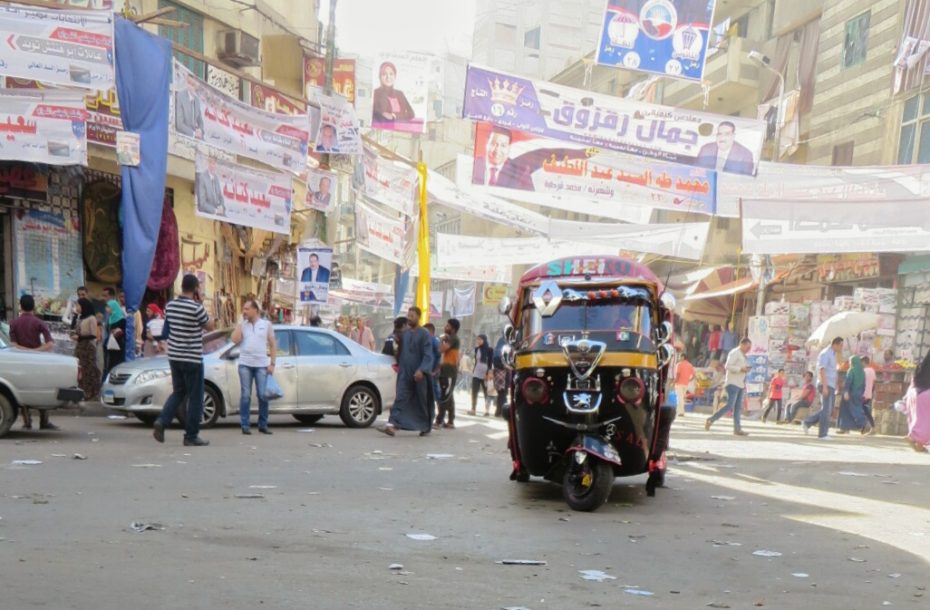
Election fever hits the streets of Alexandria
Other, longer standing divisions mean that any simple ideas of removing Sisi to solve the country’s problems are doomed to failure. If anyone is going to get rid of him, it wont be the angry crowds of Tahrir square again but his colleagues in the army who might decide that his increasingly erratic behaviour and pharonic ideas of blind obedience to his rule have become too much of a liability. The fact that some recent protests over Sisi’s grovelling return of two islands in the Red Sea back to his Saudi benefactors have been allowed to go ahead, would indicate that the powers that be are not quite so united behind him. Previous protesters have been dissuaded by automatic weaponry and several hundred volts to the genitals a long time before they got anywhere near the streets.
President Mubarak had spent many years buying military loyalty by handing over more and more of the economy to the generals, a trend wholeheartedly embraced by Sisi, such that even the most modest estimates put the portion of the economy controlled by the army at over 30% but others go as high as 60%. So tangled is the web of interests held by current and retired army figures I doubt we will ever know for sure. Sisi’s replacement will do nothing to erode the vast source of personal income that senior military figures are enjoying. As an insurance policy they have handily written themselves some laws protecting them from potential prosecution. Whatever future government Egypt has, it will always be held to ransom by the army’s interests. Probably not what the protesters at Tahrir Square had in mind when they chanted, “the people and the army are one hand”, in the fight to oust Mubarak. In one sense however, their chant was true: every young man has to do national service so there is a limit to the number of soldiers who are prepared to shoot at innocent protesters, who may well be friends and family, which leaves the much despised police force to do the rest of the dirty work for the government.
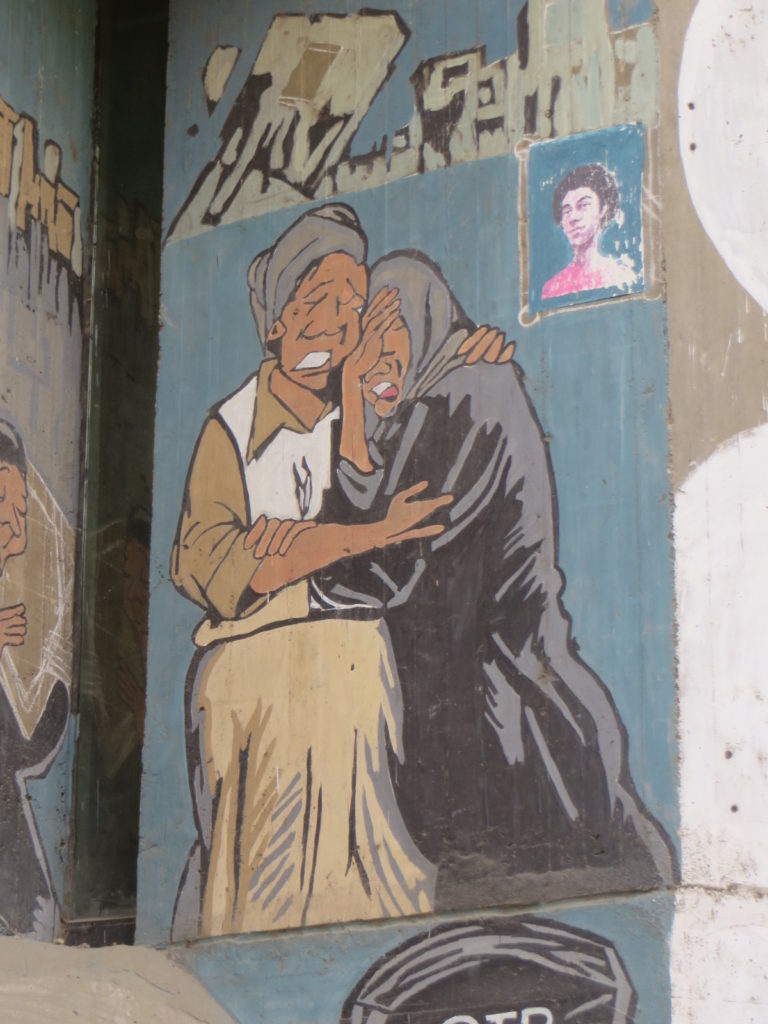
Some of the revolutionary graffiti that is still left in Cairo
Sisi vs the Muslim Brotherhood has been the obvious political division since he opted for the Bush and Blair approved method of claiming his opponents were all terrorists. The Brotherhood’s carefully engineered removal from power with the full support of the establishment, culminated in the massacre of Rabaa Square, where pregnant women, grandparents and kids were deemed to be violent, subversive, enemies of the state, along with the thousand or so other innocents machine-gunned that day. All with barely a whimper from the good old West that loves to lecture the world on human rights, before it went back to selling arms as usual, just in case Sisi needed to kill anyone else.
The Brotherhood’s brief spell in office, even without the army’s machinations, was doomed to failure because of their arrogance that dismissed policies and a constitution that would have kept the bulk of the regime’s opponents on their side. With the establishment and media all conniving to discredit them as well, it is little surprise that even many opponents of Sisi are still saying that the Brotherhood had to go, rather than have waited for democracy to take its course and voted them out at the next election. They even manged to lose the support of the Salafi parties (the more puritanical Islamists), who then went on to opportunistically play a part in the Sisi government, only to be decimated in the following elections for their treachery. With many Sufis (more spiritually minded Muslims) and people with a relaxed interpretation of Islam even the Brotherhood can be viewed as overly strident in their faith by some, so politically minded Salafis are a step too far for most. Even the Salafis cannot be pigeonholed into one group and have their own divisions.
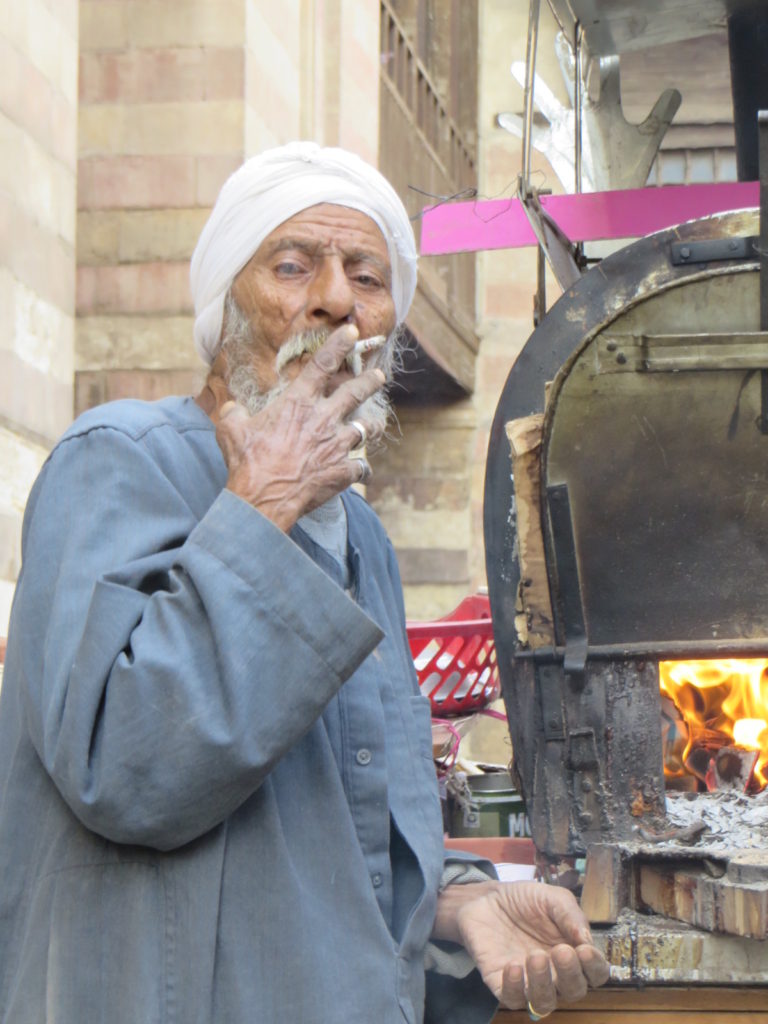
A baked potato seller on a quick ciggie break
The political failure of the revolution has to lie in the divisions of those not supporting either the Brotherhood or the post-Mubarak establishment. The moment they formed more than one political party was the revolution’s death sentence in any political sense. Instead they created more than a dozen, leading to the inevitable playoff between the Brotherhood and the establishment. Although the barbarity of the current regime has persuaded some to work together it is difficult to imagine them ever forming the bonds required to cross the secular-religious divide and create a coherent opposition. Egypt lacks a Mandela, Suu Kyi or a Khomeni waiting in the wings to hold enough of the country together after any kind of revolution and should any such figure arise they will have the balancing act of the century to perform.
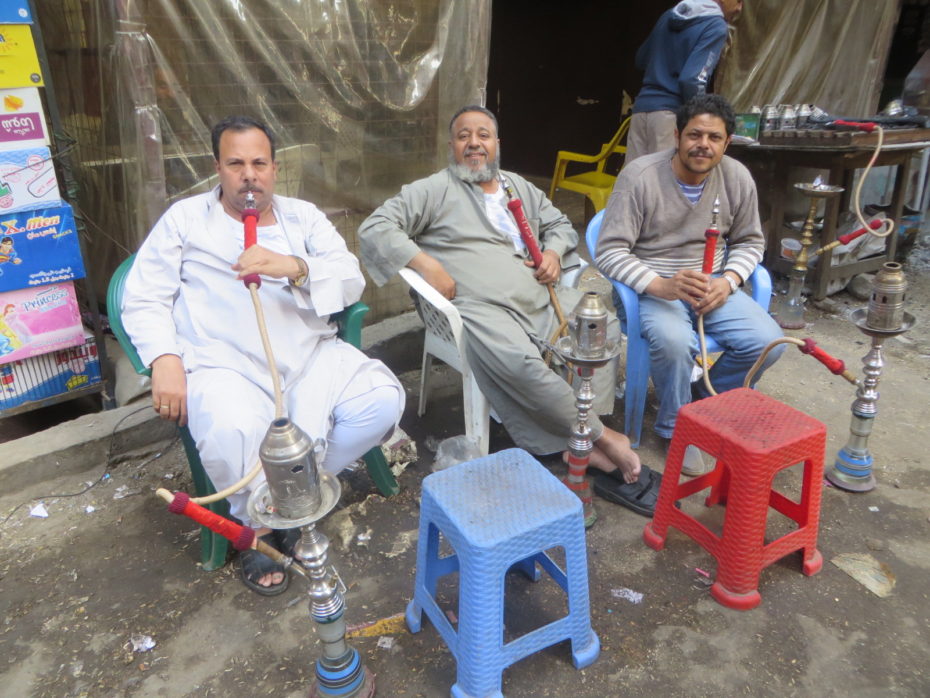
Not waiting for the next revolution
If the revolution left one thing it is that the youth have, at least in some respects, firmly declared their difference from their parent’s generation, even if they are not always united in politics and religion. Many do not see a clash between, often fairly conservative religious values and what some in the West would like to refer to as the modern world and part of the battle is seen as one against entrenched Egyptian cultural norms rather than religious ones per se. This is particularly true of young women who would like to work, study, travel and even love abroad but face excommunication from their families even if they could fund themselves. This need for control is more borne out of a misplaced sense of over protection, itself linked to the much abused concept of honour. By appearing not to be properly protecting their daughter, the family’s honour can be questioned well before the daughter even runs the risk of acting in a way that might actually be construed as dishonourable.
How many women will be prepared to risk that sacrifice and how many parents will be prepared to slacken the leashes on their daughter’s behaviour will determine how quickly things really will change. It may take a whole new generation of kids to grow up, parented by this generation before we see anything significant though. Egypt is still without doubt a conservative society and generational differences do not mean that kids love their parents any less, at least enough to go totally against their wishes.
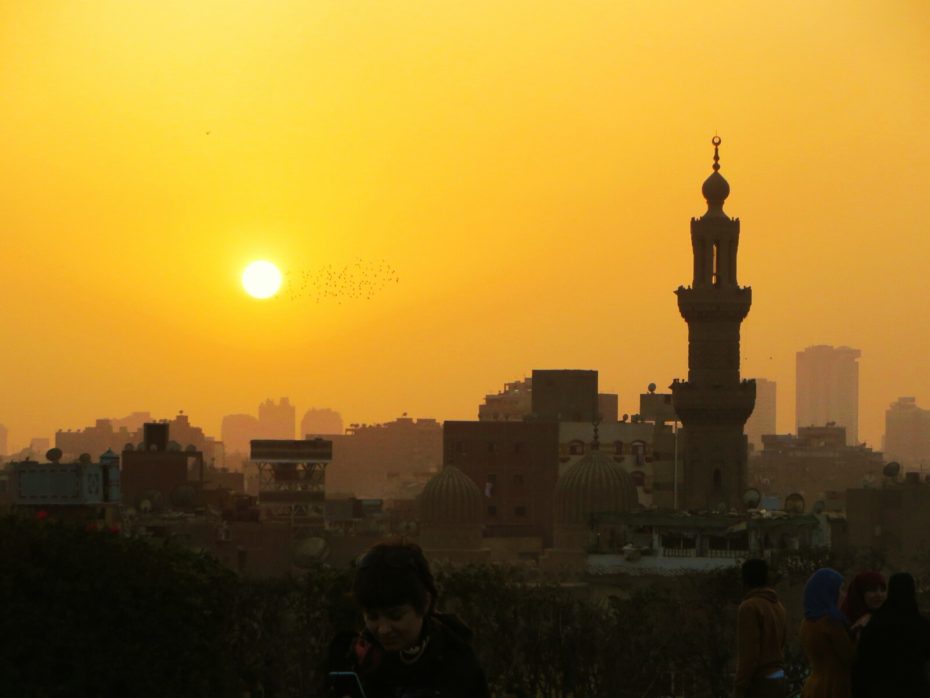
The sun setting on Sisi’s reign over Cairo?
However much men may have changed politically there isn’t much evidence that their views on women have changed much unfortunately, as I detailed in Egyptian Sex and the City. There is another disconnect with the treatment of women and that is with the images in the media and advertising. Despite a good 90% of women covering their hair in public you are, at times hard pressed to see a hijab in films, tv drama, pop videos and billboards. It’s like a part of the nation is in denial that the majority of the people are religious. Even at the Coptic Christian church services I saw, all the women covered their hair, so it’s not simply an Islamic issue. However there have been the modest beginnings of a trend to remove the hijab, even supported by some scholars. The restrictions on viewing women’s flesh certainly doesn’t apply to clothing and lingerie packaging, where pictures of scantily clad ladies are often on prominent display in the markets.
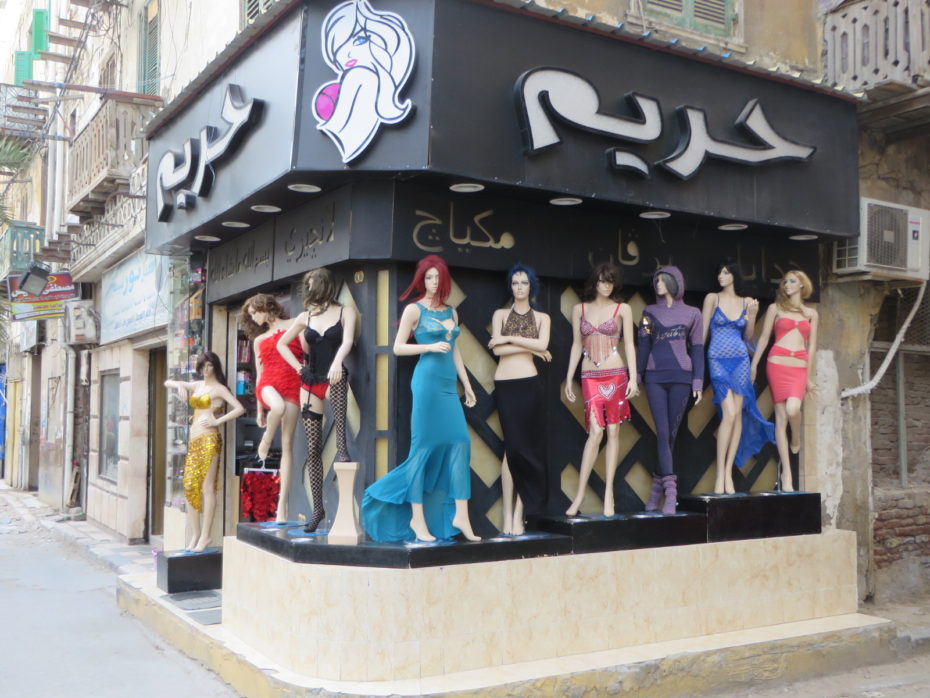
The sexier the lingerie the louder the shop would play Quranic recitation to compensate
With this allegedly being a travel blog we should ask where is the division in Egypt for visitors and the answer is easy: Luxor. After encountering some of the best that humanity has to offer on the route south from Cairo, arriving in Luxor and then Aswan you cease to be a human being in the eyes of a large portion of those who will “serve” you. Instantly you are transformed into a wallet to be mercilessly extorted and pestered. Any suggestion that you might possibly have been over charged is greeted with fake incredulity. I am not one to quibble over a bit of tourist tax but, in Aswan particularly, prices regularly evolved into four or five times the going rate. I wouldn’t want to overstate my skills in Arabic but at every restaurant and cafe I could at least greet, order and thank staff but 70% of the time the moment of saying “bikam”? (how much) would be the cue for a blazing row with me hurling money and abuse at the extortionist. So you can imagine how much respect talking in English or God forbid, Chinese is going to get you and it is the Chinese that are the one thing saving the tourist industry from complete ruin.
It’s easy to tell that you are going to be ripped off, as the moment you ask the price of the bill there’s a pause where the mental cogs are whirring with the question, “how much can I get away with charging this idiot foreigner”? With a few notable exceptions that I made the point of frequenting and tipping well for their honesty, you may as well stick with the posh tourist establishments with menus in English and clearly displayed prices, as ultimately you will be paying no more for something of better quality but you still need to check the bill as some still made “accidental” additions. And don’t imagine that the humble falafel seller with his little stall in the street will treat you with any more respect, despite his cheery demeanour. One cafe was at least “honest” enough to have written in Arabic on the price list, “foreigner 5 guinea”, twice the price for the locals for tea and coffee.
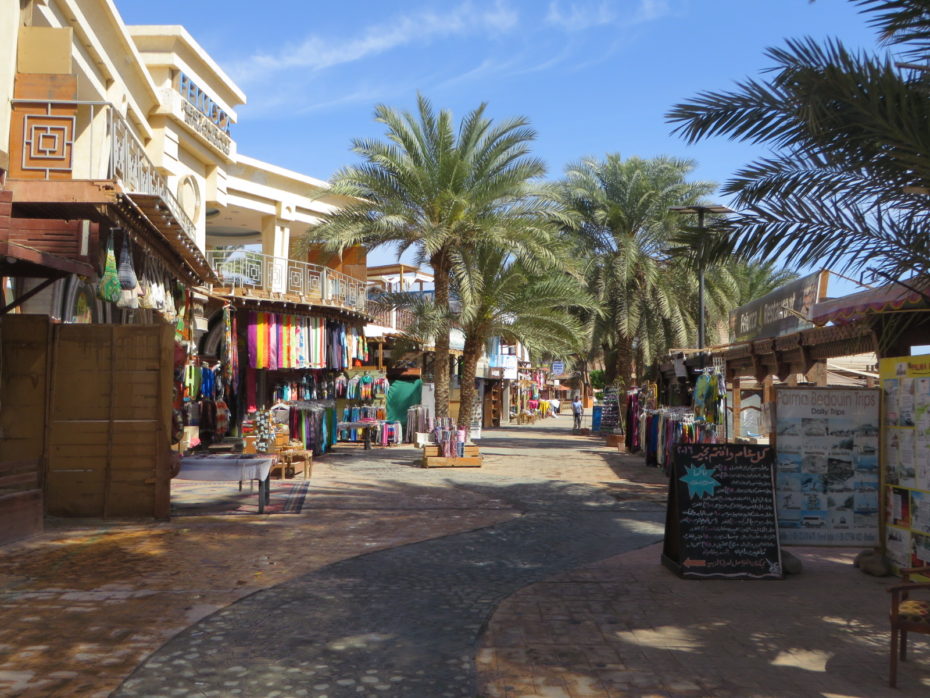
If you do want the beach experience without the hassle go to Dahab, the chilled out back packer cousin to Sharm. As you can see, currently only lacking tourists
Many Egyptian friends had raved about Aswan and how friendly it was but for me it was the most godforsaken hell hole in the entire country. Even the invite to dinner from the Imam of the ancient mosque in Luxor turned out to be a “contribution to the orphans” and my generous donation, easily equal to the price of a good tourist meal was met with a disdainful, “is that all” look that I foolishly gave into.
Outside the tourist areas of Cairo there was little reason to question the motives of those you encountered in the street but in Luxor and Aswan the sense of trust I had built up over five months in Egypt was mercilessly dashed against the rocks of greed.
Despite all the talk of division, all is not lost for Egypt, it is not a Libya with its fierce tribal loyalties or a Syria with its sectarian forces waiting to be exploited by foreign powers. Citizens across the divides are rightly proud to call themselves Egyptians in a way that only thousands of years of shared history can unite. Whatever badge of allegiance the people wear they are, above all Egyptians first and foremost. It is this that will hold the country together as it is dragged over the ragged road ahead to a new but no doubt imperfect future.




